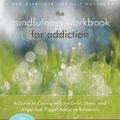
The Mindfulness Workbook for Addiction: A Guide to Coping with the Grief, Stress and Anger that Trigger Addictive Behaviors
Rebecca E. Williams PhD
The Mindfulness Workbook for Addiction offers a mindfulness based program for treating addiction created by two psychologists in the Veteran's Administration health care system. This unique approach addresses the grief and loss that are often at the root of addiction. Key Selling Points: ? One in eight American adults has a significant problem with alcohol or drugs (US Department of Health and Human Services). Page 60 of 83 TIP SHEET TIP SHEET ? Rebecca Williams and Julie Kraft are psychologists in the Veteran's Administration health care system, where addiction issues are rampant. Their unique approach to addiction management, presented in this book for the first time, links addiction to feelings of grief and loss. ? Research has indicated that mindfulness training is an effective treatment for emotion dysregulation, stress, depression, and grief--all issues that can lie at the root of addiction.This workbook incorporates the best techniques from dialectical behavior therapy (DBT), cognitive behavioral therapy (CBT), and acceptance and commitment therapy (ACT) for the treatment of addiction, including emotion regulation, distress tolerance, and defusion skills. Description: Most addictive behavior is rooted in some type of loss, be it the death of a loved one, coming to terms with limitations set by chronic health problems, or the end of a relationship. By turning to drugs and alcohol, people who have suffered a loss can numb their grief. In the process, they postpone their healing and can drive themselves further into addiction. The Mindfulness Workbook for Addiction offers readers an effective program for working through their addiction and grief with cognitive behavior therapy (CBT), dialectical behavior therapy (DBT), and acceptance and commitment therapy (ACT). Created by two psychologists who work for Veterans' Affairs, this mindfulness training workbook is effective for treating the emotion dysregulation, stress, depression, and grief that lie at the heart of addiction. No matter the loss, the mindfulness skills in this workbook help readers process their grief, determine the function their addiction is serving, and replace the addiction with healthy coping behaviors. Author Bio: Rebecca E. Williams, PhD, is a clinical psychologist specializing in recovery from mental illness and addictions. She is director of the Veterans Administration San Diego Healthcare System's Wellness and Vocational Enrichment Clinic and the Psychosocial Rehabilitation and Recovery Center. She is currently associate clinical professor in the Department of Psychiatry at the University of California, San Diego and adjunct faculty at the University of San Diego. She is coauthor of Couples Therapy for Alcoholism. Julie S. Kraft, MA, received her master's degree in marriage and family therapy from the University of San Diego's School of Leadership and Education Sciences. She has provided counseling to veterans and their family members at the Veterans Administration San Diego Healthcare System and provided psychotherapy to children, families, and couples in community settings. In her current position with Sharp Healthcare, Kraft treats clients struggling with both addiction and mental health concerns. She lives and works in San Diego, CA.
Booko found 2 book editions
Product filters
| Product |
Details
|
Price
|
New
|
Used
|
|---|---|---|---|---|
|
|
New: Being refreshed...
Used: Being refreshed...
|
New: Being refreshed...
Used: Being refreshed...
|
Being refreshed... | Being refreshed... |
|
|
New: Being refreshed...
Used: Being refreshed...
|
New: Being refreshed...
Used: Being refreshed...
|
Being refreshed... | Being refreshed... |
Booko collects this information from user contributions and sources on the internet - it is not a definitive list of editions. Search Booko for other editions of The Mindfulness Workbook for Addiction: A Guide to Coping with the Grief, Stress and Anger that Trigger Addictive Behaviors.











![Cover Art for B00VXXE1EY, [LEGO Amazing Minifigure Ultimate Sticker Collection] (By: Dorling Kindersley Publishers Ltd) [published: January, 2013] by Dorling Kindersley Publishers Ltd](https://bn.bkocdn.info/covers/6a05d6de4f9c64f7/v/167x250.jpeg)









